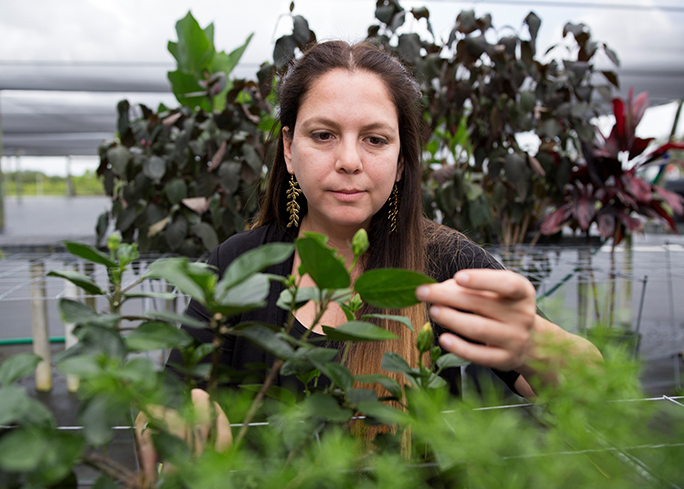
HOMESTEAD, Fla. – A University of Florida plant pathologist is part of a national team studying ambrosia beetles in fruit trees and woody ornamental crops, thanks to a $7.5 million federal grant.
University of Florida (UF) plant pathologist Romina Gazis, who studies fungal-associated diseases affecting many types of tropical and subtropical crops, and her colleagues received a grant from the U.S. Department of Agriculture National Institute of Food and Agriculture (USDA-NIFA) to study ambrosia beetles and their associated fungi.
Over the next four years, the team will explore the behavior, impacts and vulnerabilities of ambrosia beetles, develop and implement monitoring tactics and identify mitigation strategies.
“It is critical that we understand the biology of the fungi associated to these beetles,” said Gazis. “The ambrosia fungi are the food source for the beetles and often are the causal agent of the diseases seen on their plant hosts. My role within the research team is to provide support to other laboratories in the identification, characterization and understanding of the fungal symbionts — the ambrosia fungi — associated with the ambrosia beetles.”
Gazis will also lead efforts to develop biological control strategies to manage fungal diseases transmitted by the ambrosia beetles, and she’ll use the avocado crop as a model system. Gazis’ portion of the grant is $300,000.
“I will use the avocado as a model system to test the possibility of using ‘good fungi’ to combat the ‘bad fungi’ carried and transmitted by ambrosia beetles,” said Gazis. “If we prevent the establishment of ambrosia fungi in the host plant, the beetles will have no food to eat and will consequently not be able to establish a colony inside the plant.”
Exotic ambrosia beetles established in the United States are emerging as highly destructive pests in apple and pecan orchards and continue to damage trees in ornamental nurseries. Beetle infestations cause significant economic damage in these three commodity groups. Substantial losses have been reported throughout the eastern United States and are more notably known as the culprit of Laurel wilt disease on the Florida avocado industry.
“To date, Laurel wilt has caused the loss of more than 140,000 trees in Florida, threatening not only the livelihood of the farmers but also the state’s economy, as the avocado industry has an overall economic impact of about $100 million per year,” said Gazis.









